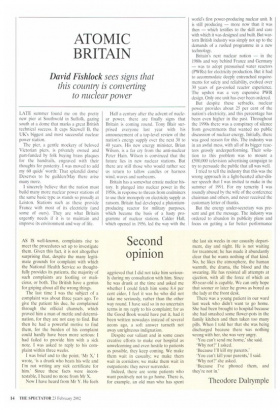Second opinion
AS IS well-known, complaints rise to meet the procedures set up to investigate them. Given this fact, it is not altogether surprising that, despite the many legitimate grounds for complaint with which the National Health Service so thoughtfully provides its patients, the majority of such complaints are footling or malicious, or both. The British have a genius for griping about all the wrong things.
The last time I was the subject of a complaint was about three years ago. To give the patient his due, he complained through the official channels, which proved him a man of mettle and determination, for they are not easy to find. But then he had a powerful motive to find them, for the burden of his complaint could hardly have been more serious: I had failed to provide him with a sick note. I was asked to reply to his complaint within three weeks.
I was brief and to the point. 'Mr X,' I wrote, 'is a drunk who beats his wife and I'm not writing any sick certificate for him.' Since these facts were incontestable, I heard no more from Mr X, Now I have heard from Mr Y. He feels aggrieved that I did not take him seriously during my consultation with him. Since he was drunk at the time and asked me whether I could fetch him some 8.4 per cent cider, I feel it was he who did not take me seriously, rather than the other way round. I have said so in no uncertain terms in my reply to his complaint; for as the Good Book would have put it, had it been written nowadays instead of several aeons ago, a soft answer turneth not away unrighteous indignation.
Despite our valiant and in some cases creative efforts to make our hospital as unwelcoming and even hostile to patients as possible, they keep coming. We make them wait in casualty; we make them wait in corridors; we make them wait in outpatients: they never surrender.
Indeed, there are some patients who want positively not to go home. There is, for example, an old man who has spent the last six weeks in our casualty department, day and night. He is not waiting for treatment; he has made it abundantly clear that he wants nothing of that kind. No, he likes the atmosphere, the human warmth, the drama, the blood and the swearing. He has resisted all attempts at ejection, with all the force of which an 80-year-old is capable. We can only hope that sooner or later he grows as bored as the lady at the front desk.
There was a young patient in our ward last week who didn't want to go home. She had been brought to hospital because she had smashed some flower-pots in the family kitchen and then taken too many pills. When I told her that she was being discharged because there was nothing wrong with her, she was very angry.
'You can't send me home,' she said. 'Why not?' I asked.
'Because I'll kill my parents.'
'You can't kill your parents,' I said.
'Why not?' she asked.
'Because I've phoned them, and they're not in.'
Theodore Dalrymple






































































 Previous page
Previous page